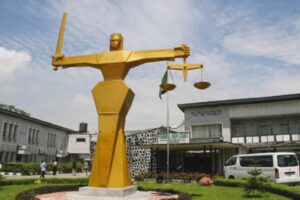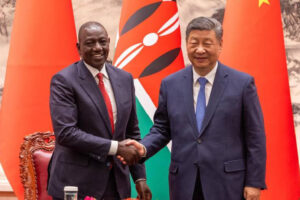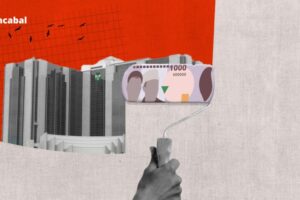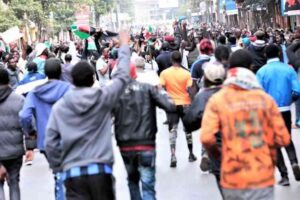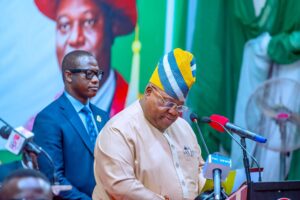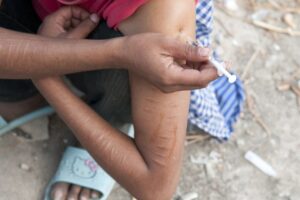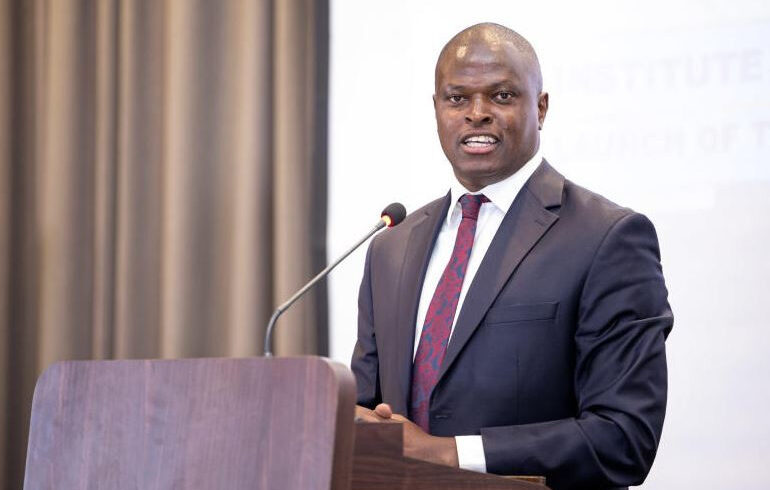
Kiharu MP Ndindi Nyoro speaking during the launch of the institute’s annual national shadow budget for 2025-26 financial year. [Wilberforce Okwiri, Standard]
The Road Maintenance Levy (RML) has handed Sh119.7 billion to the Kenya Revenue Authority (KRA) in the 2024/2025 financial year, a 50.9 per cent increase in its contribution to the taxpayer.
The significant increase follows the levy’s hike by Sh7 per litre of super petrol and diesel in July 2024. This saw motorists pay Sh25 at the pump, up from Sh18.
KRA collects the levy on behalf of the Kenya Roads Board, which is then disbursed to different roads agencies for the maintenance of Kenya’s network of roads.
The levy is currently subject to heated debate following the National Treasury’s move to use it as collateral in borrowing funds. The Treasury is expected to raise Sh175 billion through the securitisation of the levy for use to pay pending bills in the transport sector and revive stalled projects.
Follow the The Standard
channel
on WhatsApp
“Collection of the Road Maintenance Levy (RML) grew by 50.9 per cent to Sh119.7 billion. The growth in RML is attributed to an increase in the applicable rates from Sh18 per litre to Sh25 per litre,” said the taxman in a statement on Thursday, adding that the higher RML collections saw oil taxes grow 12.1 per cent to Sh338.28 billion.
The Roads Board has in the past decried the stagnation of the levy at around Sh80 billion per year, despite growing road maintenance demands. The board has previously said it needed Sh253 billion for road maintenance over the 2024/25 financial year.
The Transport Ministry had increased the levy by Sh7 in a gazette notice last year, which resulted in public uproar and was even contested in court. The government, however, went ahead to implement the hike.
This week, the hike in the road levy was fingered as among the factors that led to a sharp increase in the cost of petroleum products, with a litre of diesel, super petrol and kerosene increasing by about Sh9 each.
Kiharu MP Ndindi Nyoro raised concerns about high levels of petroleum taxes in the country, but also called out the government for using the road levy as collateral to secure a Sh175 billion loan. He noted this has been without approval from Parliament and has also been kept off the official loans register.
“This borrowing is not reflected in official debt records, and Parliament was never consulted; this raises serious concerns about transparency, legality, and the long-term sustainability of public finances,” said Nyoro.
He warned that the government is now spending money collected in advance for the next several years, locking out future administrations from making budgetary decisions.
“If we continue using public levies as collateral for loans without parliamentary oversight, what will stop future lenders from securitising our VAT, PAYE, or NHIF? What will be left of Kenya’s financial sovereignty?” he posed.
Treasury CS John Mbadi dismissed Nyoro’s claim, arguing that he would continue doing it.
“There is nothing secret about securitisation. Everybody knows it. Where does he live if he doesn’t know we were securitising this money? We will continue doing it, and we have no apologies to make,” the CS said.
He, however, said only the additional Sh7 has been used as collateral and that the Sh18 was untouched and would continue to be used for road maintenance.
Stay informed. Subscribe to our newsletter
In its statement yesterday that revealed the sharp growth in the RML, KRA also said that its Customs and Border Control (C&BC) Department recorded an accelerated growth rate of 11.1 per cent in revenue collection to collect Sh879.3 billion.
“This denotes a performance rate of 105.9 per cent at the close of the 2024/2025 financial year, translating to an average daily collection of Sh3.546 billion,” said KRA.
“Customs and Border Control performance was driven by non-oil taxes, which grew by 10.3 per cent to Sh541.053 billion and oil taxes, which grew by 12.5 per cent to Sh338.276 billion.”
Follow the The Standard
channel
on WhatsApp
